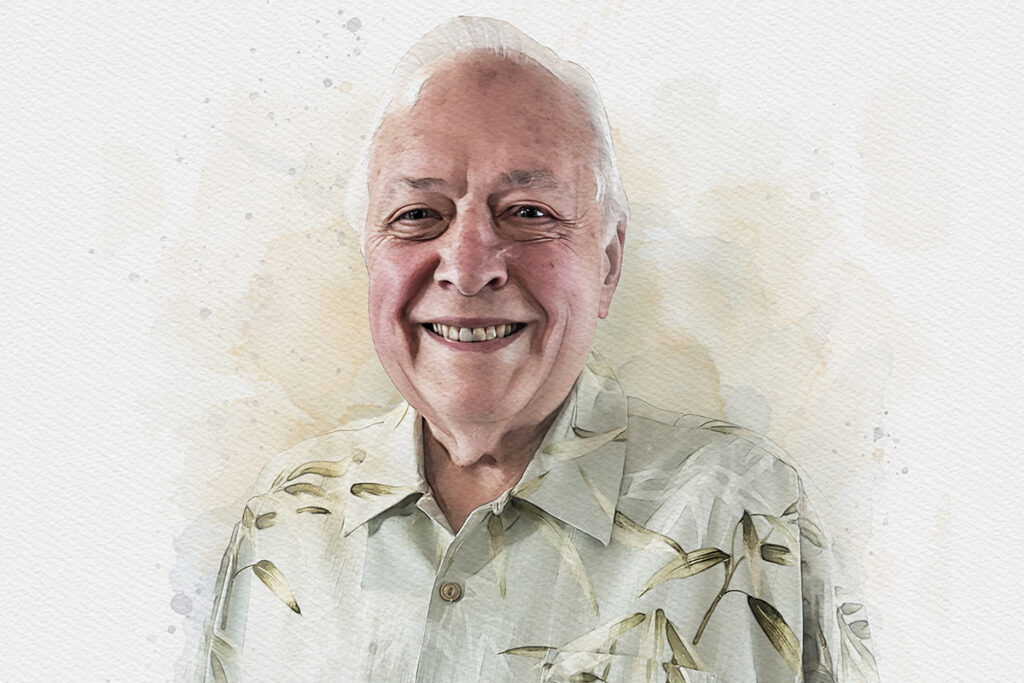These prominent golden-agers talk about lifelong achievements, what they learned through the years, what they are planning on next and how living longer is a rewarding daily adventure.
Written by David Hodes
Interviewed by David M. Block, David Hodes and Pete Mundo
Fred Broski
Birth date: August 22, 1936, Age: 88

“We should meet everybody with a little bit of happiness, whether you work on TV or you’re famous or not.”
There was a time in the 1970s when a television game show franchise called Bowling for Dollars became a hit TV series across the country, from New York to Honolulu and even in Canada. For the game, contestants had three tries to knock down as many pins as possible. Prizes were awarded based on points scored. Each contestant had Pin Pals—viewers at home who submitted postcards, which were then randomly picked out of a tumbling hopper on set. When the bowler won, the viewer at home won.
But the big winner in the Kansas City version was the show’s host, career broadcaster and KMBC on-air personality Fred Broski. “This was the biggest thing that ever happened in my career,” he says. “When this thing came to town, it just flew.”
The show was originally filmed at King Louie West Lanes in Overland Park, but KMBC later installed two lanes in their studio. It was on the air for seven years. Broski was right in his element as announcer, making up dialogue with the bowlers and working directly with everyday people who became his bread and butter throughout his career.
Career Path

Broski’s long and storied career began in radio because he couldn’t get on television in Kansas City. “I just wanted to be a straight staff announcer, but staff announcers went out of the picture back in those days in the early ’50s,” he says. He went to St. Joseph, then Columbia, then back to WDAF in Kansas City, hosting a show in 1962—his first on-air job in Kansas City—that lasted about five weeks. “I’m waiting for the phone to ring, and nobody calls,” he says. “I’m going around to all the stations every week trying to get auditions. Can’t get an audition.”
Broski built up a production freelance business on the side while working at KBEA radio station, but he still had “this tremendous love to get on television all the time.” He was announcing at a local car racetrack when he crossed paths with an executive at KMBC. He got a job reporting sports, then mentioned that he had done work as a weatherman. And it was off to the races for his television career.
Bowling for Dollars

Broski worked at KMBC from 1966 to 1969, had a falling out with management, came back, and then Bowling for Dollars came into his broadcasting life. “That was a phenomenal success,” he says. “My life was so busy with doing the bowling show and my freelance work. I started a bowling tournament attended by 5,000 to 6,000 people a year. It got to be a monster. And the pressure was building on me that I just couldn’t do everything.”
In 1974, Broski would make sales calls on a Monday. Monday afternoon, he did a weather show. Then he would do three bowling shows. Then maybe another weather show. Tuesday, same thing. Wednesday, Safeway commercials. Thursday, work for Farmers Insurance. Friday, Saturday and Sunday—more stuff. “I did this after a while,” he says. “You have all the stuff going on. I have nobody working for me, and I’m running this little cottage industry all by myself. People that hire me and my business don’t hire me for somebody else. They hire me to do their work.”
One night, he says, he just came home and felt like he’d hit a wall. “My blood was just bubbling,” he says. “It was nerve-wracking because I never said no to anything. But I had to have some fun time with my family and my wife because I have a great family. I was born and raised here. I was still hanging out with my old buddies from grade school once in a while and having dinner together when time would permit.”
The Maverick
His stint with KMBC ended in 1979. He then got hired as weatherman at KCTV and wrapped up his TV career working part time there in 1998.
“I’m a maverick,” Broski says. “I wasn’t a long-term employee. I marched to a different drummer. Most people would start off at a company and work five, 10, 20 years, maybe switch to something else and work another 10 to 20 years, and then they’re done. The longest I ever worked full time for anybody was four years.”
The lessons that stuck with him over his career could be summed up as DDD—desire, dedication and determination. “You got to have them all,” he says. “And you can’t be afraid to work. Don’t be afraid to work more than 40 hours a week. It’s just that simple. When somebody asks you to do something extra, you got to do it. You just got to do it. Because you just can’t give all the orders at your younger age. You give orders later, but at the younger age, just do what you’re told and keep your nose to the grindstone.”
The other thing he says he would tell people about living and working successfully is to have a wonderful spouse. “Your spouse needs to love you, and you need to love your spouse,” he says. “I was very fortunate there because, as I do these crazy things and take chances, I sometimes win and sometimes lose. When that person’s by your side all the time, you’re a winner no matter what happens. That’s the best thing is to have somebody go with you and get on that train together.” (Broski’s wife, Jane, passed away in 2022.)
A lot of Broski’s work was flying by the seat of his pants, staying flexible and just keeping the gig going. “When you start off like I did, you have this great desire to be on television, and you don’t have the best vocabulary in the world, and you don’t have the education or anything else,” he says. “You didn’t have teleprompters. You had guys holding cue cards once in a while. But they say: ‘Okay, you’re going to do this kids’ show. You play a cartoon. You have to fill three minutes in between the cartoons. You better think of something.’ So this all goes into the overall deal. You just learn to adjust to the situation. And after you do all this stuff for a number of years and still have the desire to be on television, it’s easy.”
The Later Years
Broski spends his retirement now enjoying time with his two children, Brian and Julie, and five grandkids. He works on oil paintings. Dozens of beautiful paintings hang on the walls in nearly every room of his house.
He says some of the best advice he got was during his time as a weatherman at KMBC. A viewer called the station and complained about him. “It hurt me because here was somebody who didn’t like the way I did the show,” Broski says. “Then Len Dawson walks in and tells me that is what people go through in sports. He says: ‘You go through high school and everybody’s pulling for you. You go through college, everybody’s pulling for you. You get to the top. You go into pro sports, everybody’s pulling for you. Then you win the Super Bowl, they all try to tear you down.’ He said: ‘You’re at the top. Don’t let them tear you down.’ I’ll never forget that.”
“I’m a maverick. I wasn’t a long-term employee. I marched to a different drummer.”





